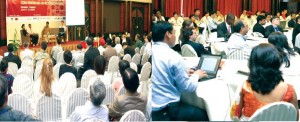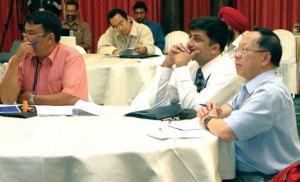 As Asia prepares to surge ahead towards information driven economy, leading to large-scale improvements in GDPs of many countries, there are new opportunities created for expanding the sector. Digital Commons explores three key areas, viz., access to knowledge and culture in Asia, exploring models for collaborative knowledge and culture in Asia and conceptualising a healthy digital commons. There has been much discussion on the role and impact of copyright and patent issues for the past few years both at the micro and macro level of economic activity. Copyright and patent issues are forms of intellectual property. Copyrights grant exclusive rights on expressive forums of ideas and information for a limited time while patents grant exclusive rights on processes for a limited time. Patents, particularly software and business process patents are currently not valid in most Asia-Pacific countries, but are very relevant considering what may or may ot affect a healthy Asian digital commons. The need of generating more discussion to gain increased understanding of the effects of software patents led to a consultation called, Asia Commons, the Asian Conference on the digital commons which was held in Bangkok, Thailand from 6-8 June, 2006. Asia Commons was organised by Bellanet Asia (a Partnership of SAP International and Bellanet), Bellanet Conference Report International, Centre for Science, Development and Media Studies, and UNDP APDIP’s International Open Source Network (IOSN) along with some local partners like Asian Institute of Technology and Thai Rural Net and funding partners like International Development Research Centre’s Pan Asia Networking and UNDP APDIP’s IOSN. The platform that brought together some 130 researchers, advocates, practitioners and custodians of public information from Asia Pacific and all around the globe, contributed tremendously in terms of increasing nderstanding of the effects of copyrights and patents, specifically software patents on access to knowledge and culture in Asia, identifying information gaps, conceptualising and enhancing partnership models for wider dissemination of knowledge and decision making. The face-to-face meeting was preceded by a highly participatory planning of the issues and a three eek online consultation was held to build a collective understanding of the contemporary issues and to familiarize oneself with the kind of participation. Three papers were commissioned out of an open call for
As Asia prepares to surge ahead towards information driven economy, leading to large-scale improvements in GDPs of many countries, there are new opportunities created for expanding the sector. Digital Commons explores three key areas, viz., access to knowledge and culture in Asia, exploring models for collaborative knowledge and culture in Asia and conceptualising a healthy digital commons. There has been much discussion on the role and impact of copyright and patent issues for the past few years both at the micro and macro level of economic activity. Copyright and patent issues are forms of intellectual property. Copyrights grant exclusive rights on expressive forums of ideas and information for a limited time while patents grant exclusive rights on processes for a limited time. Patents, particularly software and business process patents are currently not valid in most Asia-Pacific countries, but are very relevant considering what may or may ot affect a healthy Asian digital commons. The need of generating more discussion to gain increased understanding of the effects of software patents led to a consultation called, Asia Commons, the Asian Conference on the digital commons which was held in Bangkok, Thailand from 6-8 June, 2006. Asia Commons was organised by Bellanet Asia (a Partnership of SAP International and Bellanet), Bellanet Conference Report International, Centre for Science, Development and Media Studies, and UNDP APDIP’s International Open Source Network (IOSN) along with some local partners like Asian Institute of Technology and Thai Rural Net and funding partners like International Development Research Centre’s Pan Asia Networking and UNDP APDIP’s IOSN. The platform that brought together some 130 researchers, advocates, practitioners and custodians of public information from Asia Pacific and all around the globe, contributed tremendously in terms of increasing nderstanding of the effects of copyrights and patents, specifically software patents on access to knowledge and culture in Asia, identifying information gaps, conceptualising and enhancing partnership models for wider dissemination of knowledge and decision making. The face-to-face meeting was preceded by a highly participatory planning of the issues and a three eek online consultation was held to build a collective understanding of the contemporary issues and to familiarize oneself with the kind of participation. Three papers were commissioned out of an open call for
papers, and they brought together an in-depth analysis of the state of affairs of the issues. These papers were shared and a peer review process was set in motion to improve the understanding of the issues. Authors Junseok Hwang and Choong Hee Lee wrote about managing the Internet digital commons, resolving the dilemma of intellectual property in cyberspace. Vijayalakshmi Balakrishnan brought an Asian Historical perspective of mediating access, and lessons that can be learnt from it. Hsin-I Huang and Tzu-Chiang Liou focused his research on the benefits of collective innovation and looked at the question,  “Why Open Source Software?” While Peter Drahos from Australian National University and Jamie Love from Consumer Project on Technology presented keynotes at the start of the Asia Commons, the sessions proceeded discussing themes like history of commons, evolution of copyright, emergence of the digital economy, copyright and information gray economy, open business models for content production, and collaborative models speed sharing where the participants had the opportunity to exchange their experiences in developing, adopting or adapting new or existing models for collaborative knowledge and content creation. Lawrence Liang of Alternate Law Forum spoke about the cultural flows represented by the piracy of films and music in Asia and the need to move away from knee-jerk media responses to piracy, and Ronaldo Lemos of FGV School of Law spoke of the pioneering efforts by those who are experimenting with new ways of distributing knowledge and creativity in Brazil. Some incredible commonsbuild rs also shared their views in the conference like Michel Bauwens, who has developed one of the most comprehensive directories of resources on ‘peer to peer sharing’ at p2pfoundation.net and Patcha from Jinbonet who, together with an organization called IP Left in Korea, developed a cartoon campaign against the IP chapter in Korea-US Free Trade Agreement negotiations. The different conference sessions were hosted by Sunil Abraham of IOSN, Shahid Akhtar of UNDP’s Asia- Pacific Development Information Programme, Laurent Elder of IDRC Pan Asia Networking, and Ronaldo Lemos of Fundação Getúlio Vargas (FGV) School of Law. In an unique attempt participants were invited at the end of all presentations to co-create the agenda for the remainder of the Asia Commons conference. A two-day long discussion on the theme ‘Towards a healthy Asia Commons: What are the ideas and issues’ brought the opportunity for the participants to convene around topics of shared interest. They were invited to initiate ideas that they would like to take one step further through discussions with potential collaborators. Asia Commons created many opportunities where deep discussions and exchanges happened between the organisers and the participants who have experience and ideas that are relevant to the conference. A number of thought leaders in the field of Access of Knowledge culture looked to innovative approaches to share the knowledge. The conference outputs are disseminated through several channels like pod casting, blogging and through bringing out a special magazine issue of i4d, the first monthly ICTD magazine in Asia, in July 2006. The energy and enthusiasm created during the conference lives on with collaborative post conference activities taken up by the participants n the wiki (including creating an entry on Asia Commons), in discussion lists and over 20 new collaborative project ideas.
“Why Open Source Software?” While Peter Drahos from Australian National University and Jamie Love from Consumer Project on Technology presented keynotes at the start of the Asia Commons, the sessions proceeded discussing themes like history of commons, evolution of copyright, emergence of the digital economy, copyright and information gray economy, open business models for content production, and collaborative models speed sharing where the participants had the opportunity to exchange their experiences in developing, adopting or adapting new or existing models for collaborative knowledge and content creation. Lawrence Liang of Alternate Law Forum spoke about the cultural flows represented by the piracy of films and music in Asia and the need to move away from knee-jerk media responses to piracy, and Ronaldo Lemos of FGV School of Law spoke of the pioneering efforts by those who are experimenting with new ways of distributing knowledge and creativity in Brazil. Some incredible commonsbuild rs also shared their views in the conference like Michel Bauwens, who has developed one of the most comprehensive directories of resources on ‘peer to peer sharing’ at p2pfoundation.net and Patcha from Jinbonet who, together with an organization called IP Left in Korea, developed a cartoon campaign against the IP chapter in Korea-US Free Trade Agreement negotiations. The different conference sessions were hosted by Sunil Abraham of IOSN, Shahid Akhtar of UNDP’s Asia- Pacific Development Information Programme, Laurent Elder of IDRC Pan Asia Networking, and Ronaldo Lemos of Fundação Getúlio Vargas (FGV) School of Law. In an unique attempt participants were invited at the end of all presentations to co-create the agenda for the remainder of the Asia Commons conference. A two-day long discussion on the theme ‘Towards a healthy Asia Commons: What are the ideas and issues’ brought the opportunity for the participants to convene around topics of shared interest. They were invited to initiate ideas that they would like to take one step further through discussions with potential collaborators. Asia Commons created many opportunities where deep discussions and exchanges happened between the organisers and the participants who have experience and ideas that are relevant to the conference. A number of thought leaders in the field of Access of Knowledge culture looked to innovative approaches to share the knowledge. The conference outputs are disseminated through several channels like pod casting, blogging and through bringing out a special magazine issue of i4d, the first monthly ICTD magazine in Asia, in July 2006. The energy and enthusiasm created during the conference lives on with collaborative post conference activities taken up by the participants n the wiki (including creating an entry on Asia Commons), in discussion lists and over 20 new collaborative project ideas.





















